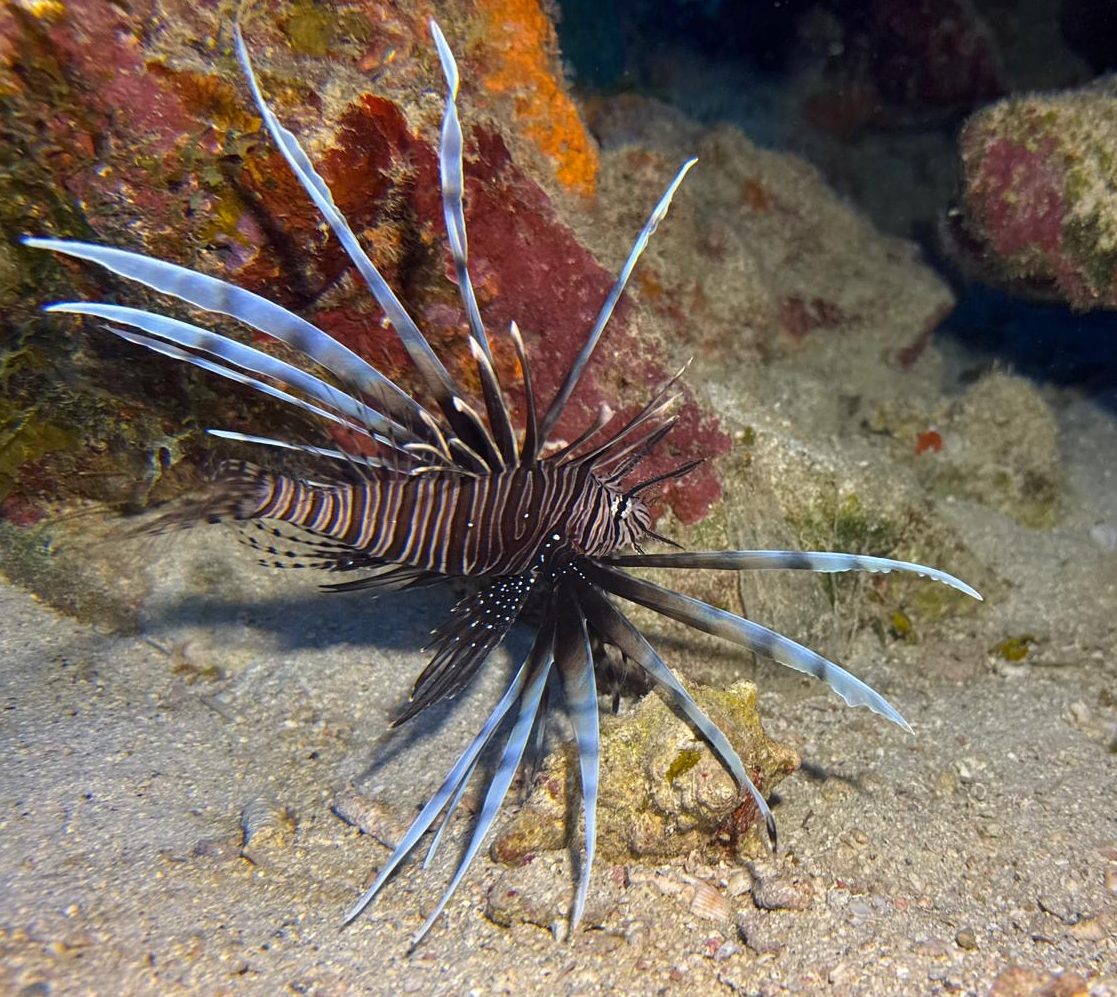Lion Fish Roundup

Lionfish Roundup
Ahoy! And welcome aboard as we dive into our beautiful, clear aqua-infused waters in search of that invasive predator of the Caribbean known as The Lionfish.

On June 20th and 21st, Stormy Pirates will be sponsoring a team of six crew members who will be participating in this year’s Lionfish Derby, an event sponsored by the Caribbean Oceanic Restoration and Education Foundation (C.O.R.E.) and the Red Hook Dive Center which hopes to stem the population of this invasive species that threatens the viability of the Virgin Islands’ reefs and ecosystems. Teams consisting of local fisherman, business people and concerned citizens will don scuba gear and peruse the waters around St. Thomas and St. John in hopes of capturing as many lionfish as possible. Every fish captured will be weighed, measured and documented.
Big Problem With Few Solutions

While the lionfish is a spectacular showstopper in many aquariums, it isn’t a welcome guest in the Caribbean. Native to the South Pacific and Indian Oceans, the red lionfish was likely introduced to the Florida coast in 1992 when Hurricane Andrew destroyed an aquarium in southern Florida, which resulted in six lionfish escaping into Biscayne Bay. It’s also been suggested that many irresponsible home aquarium enthusiasts simply release their lionfish into the ocean when they grow too large for their owner’s tanks.
While there were a few sightings of the invasive species prior to 1992, the lionfish population has soared since Hurricane Andrew with sightings now occurring everywhere from Cape Hatteras, North Carolina and the Texas coast to the Bahamas and southward through the Caribbean Islands and into South America. Estimates suggest that the lionfish population soared some 700% between 2004 and 2008.
Considered a voracious predator that competes for food and space with native species like snapper, grouper and parrotfish, lionfish reproduce frequently and prolifically. A single mature female can release two million eggs a year. As lionfish kill off more and more algae-eating parrotfish, scientists fear seaweed will eventually overtake those precious reefs that make the Virgin Islands a paradise for snorkelers. Add to that the fact that lionfish have no known predators and it creates a situation that can quickly become unmanageable.

Lionfish are skilled hunters, using specialized muscles to provide precise control of their location in the water. They also release jets of water when approaching their prey, which confuses and disorients smaller fish, making capture easier. No doubt, lionfish are the bullies of the sea, carving a path of destruction wherever they roam.
Although the first lionfish sighting on St. John was in 2008, the species didn’t seem to be a problem until 2010. On St. Croix, however, the first sighting in 2009 signaled a population that was quickly expanding. Because of that invasion, the non-profit Reef Environmental Education Foundation (REEF) visited the USVI in 2009 and suggested that an Invasive Species Management Program needed to be established, thus the inception of C.O.R.E. which was designed to assist with all facets of invasive species.
Following REEF’s lead, which has been sponsoring lionfish derbies since 2009 when they organized an event in the Bahamas, C.O.R.E. created their first derby on St. Croix on November 17, 2014. On that occasion, 615 lionfish were captured and removed according to the Caribbean Fishery Management Council. Last year’s derby on St. Croix netted 515 lionfish with the largest being 15.82 inches and the smallest squeaking in at 3.14 inches. Everyone’s efforts meant that 514 million lionfish eggs were prevented from being released into the Caribbean waters. To date, lionfish derbies are the most successful way to diminish the invasive species.
Last year was the first derby for the islands of St. John and St. Thomas which resulted in 222 lionfish being captured and removed from the sea. So far, C.O.R.E. has tracked and removed 2523 lionfish from the Virgin Island waters and all of the money raised to support the mission came from local businesses and communities.
Colorful And Flavorful
The red lionfish, otherwise known as Pterois volitans, has distinctive stripes of either brown or maroon and white stripes covering its head and body. Its fan-like pectoral fins are quite flashy and distinctive, as are the fleshy tentacles above the fish’s eyes. Lionfish have been spotted in shallow waters and as deep as 768 feet, often nestling into ledges and crevices among the rocks and coral. Sometimes they travel alone, sometimes in groups.

If you spot one while diving or snorkeling, be cautious as the spines of this fish can deliver a potent venomous sting that can last for days. Those who have been stung reported experiencing extreme pain, sweating, respiratory distress, and even paralysis. The venom is a combination of protein, a neuromuscular toxin and a neurotransmitter called acetylcholine. Always seek medical attention immediately if stung.
Despite its toxic spinal properties, the lionfish is considered safe to eat if properly filleted. NOAA actually created the “Lionfish as Food” campaign in an effort to shrink the fish’s population, touting that lionfish provide an alternative to overfished populations such as grouper and snapper while also offering a pleasing buttery and tender taste to the palate. There are several places that offer Lionfish on their menu in the Virgin Islands and the LionFish and Chips at The Twisted Cork is incredible!!
Some, though, offer caution suggesting there’s a risk of ciguatera food poisoning (CFP) from the consumption of this unique fish, but NO CASES of CFP from the consumption of lionfish have been verified and the Government of the Virgin Islands encourages Virgin Islanders to “eat the enemy” and support local fishermen who sell Lionfish and local restaurants who offer Lionfish on their menus
Another lionfish initiative is centered around the production of leather from the fish’s hide. As of yet, though, the trend for this to be a marketable high-quality of leather hasn’t quite caught fire, but its goal of controlling the invasion of lionfish populations while also providing economic and marketable benefits to fishing communities is admirable.
Two Organizations, Multiple Resources
C.O.R.E, one of the sponsors of this year’s lionfish derby, has a mission far greater than diminishing one invasive species. Since its inception, the foundation has pursued various avenues to promote understanding, preservation and care for the unique marine ecosystems that exist in the Virgin Islands and the Caribbean. Their focus encompasses five main areas: Invasive Species Management, Coral Restoration, Coral Nurseries, Marine Education & Outreach, and Promoting Reef Safe Sunscreen. For more information on their important work, visit their website.

The Red Hook Dive Center, located in American Yacht Harbor on the east end of St. Thomas, is well known for its comprehensive services for SCUBA divers, freedivers, snorkelers, and anyone interested in getting PADI certified. A recipient of the Travelers’ Choice Award, the dive center not only provides great service, instruction, and equipment to those interested in diving and snorkeling in the Virgin Islands, but they also are committed to ensuring that the Caribbean waters remain safe and free of environmental hazards like the lionfish. Their efforts to co-sponsor the lionfish derby with C.O.R.E. is just one important way this business hopes to keep the waters around St. Thomas and St. John as safe and beautiful as possible.
End Notes: We hope this post has brought some much-needed attention to the dangers of lionfish in the Caribbean waters, and we also hope you’ll cheer on our team of crew members competing in this year’s derby. Continue to follow our blogs and we’ll update you on how our team fared in the competition. It’s our hope to be the crew that captures the most lionfish as well as the largest one. As always, we here at Stormy Pirates invite you to visit our islands and see for yourself all the amazing aspects of our home. Make that trip extra special by booking a boat day with us as we promise to put the gang plank down and escort you in style.
